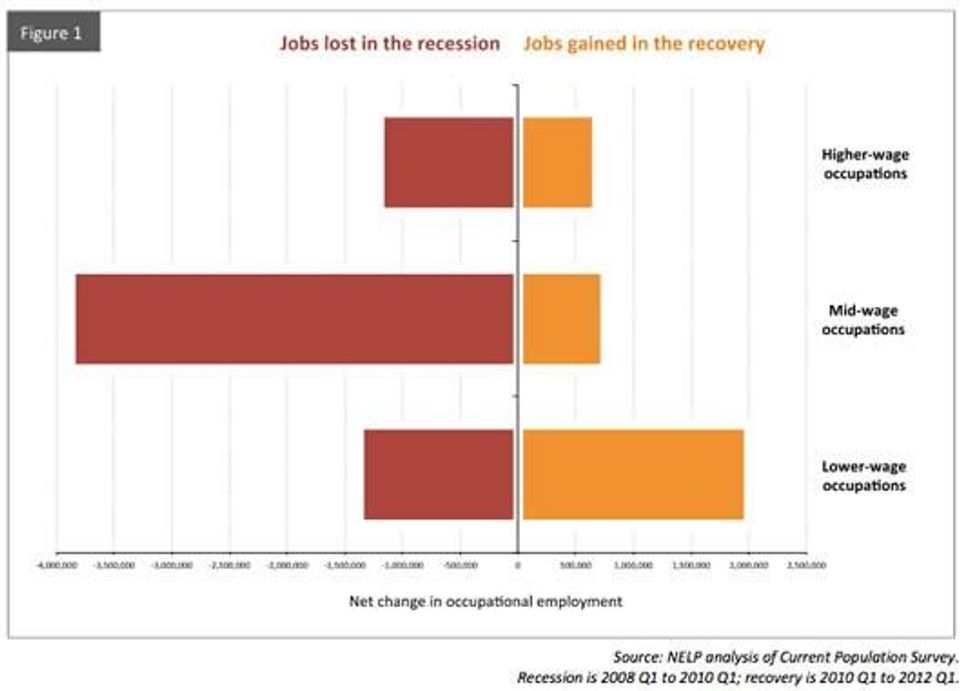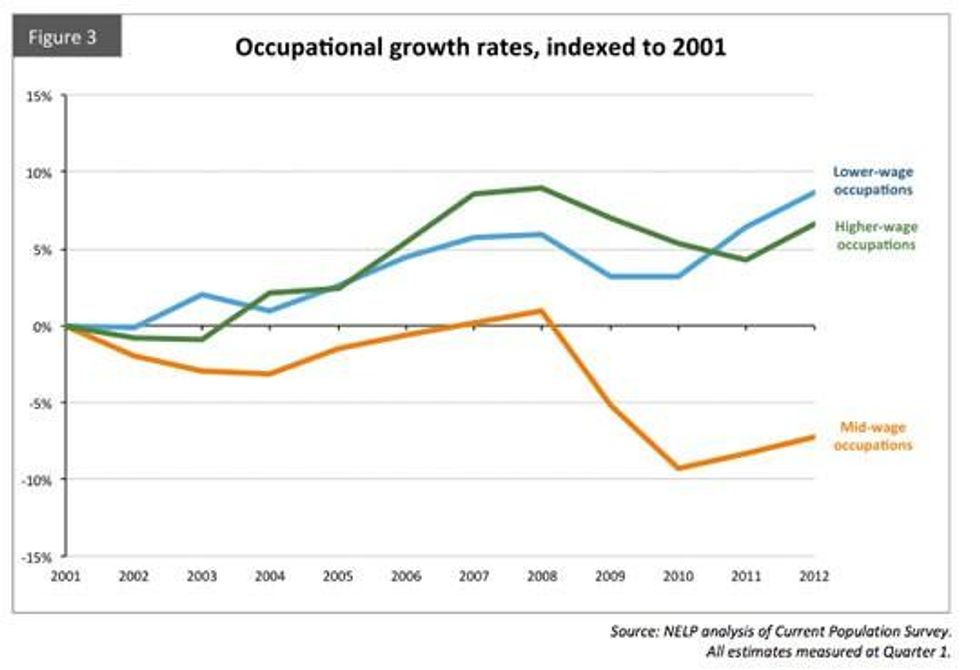The Good Jobs Deficit: Fueling Inequality
Report shows recovery skewed toward low-wage jobs
The U.S. is suffering from a good jobs deficit, a trend that is fueling inequality and leaving the middle class in tatters, according to a report released Friday from the National Employment Law Project (NELP).
Their study looked job loss and gain during the recovery, the first quarter of 2010 through the first quarter of 2012. It classified low-wage jobs as those earning $7.69 to $13.83 an hour, $13.84 to $21.13 an hour for mid-wage jobs and $21.14 to $54.55 for higher-wage jobs.
NELP shows how mid-wage jobs had the biggest losses during the recession -- 60% -- but it was low-wage jobs that recovered the most.
"The recovery continues to be skewed toward low-wage jobs, reinforcing the rise in inequality and America's deficit of good jobs," said study author Annette Bernhardt, Policy Co-Director at NELP. "While there's understandably a lot of focus on getting employment back to pre-recession levels, the quality of jobs is rapidly emerging as a second front in the struggling recovery."
NELP's graph illustrates the growth in low-wage jobs:

Bernhardt notes, however, that the trend of growing inequality is nothing new. "Indeed, it's important to recognize that the U.S. labor market was already in trouble before the Great Recession, the result of 30 years of growing wage inequality and shrinking numbers of good jobs," said Bernhardt.

Bernhardt notes that there is no "magic bullet" to fix the situation and says fault lies with factors including deunionization and "the growth of subcontracting and contingent work" into consideration. To help fix the "good jobs deficit," she stresses measures that stand in stark contrast to the austerity policies being enacted on both sides of the Atlantic.
"There are plenty of policies we could institute right now that would help enormously. We need to extend unemployment benefits, raise the minimum wage, create jobs by repairing our infrastructure, and help our states avoid more layoffs of teachers, cops and firefighters. It's just a question of political will and leadership," she said.
In These Times writer Michelle Chen recently observed that "the deficit in good jobs ... is a reflection of a deficit in power at the bottom, and a surplus of greed at the top."
An Urgent Message From Our Co-Founder
Dear Common Dreams reader, The U.S. is on a fast track to authoritarianism like nothing I've ever seen. Meanwhile, corporate news outlets are utterly capitulating to Trump, twisting their coverage to avoid drawing his ire while lining up to stuff cash in his pockets. That's why I believe that Common Dreams is doing the best and most consequential reporting that we've ever done. Our small but mighty team is a progressive reporting powerhouse, covering the news every day that the corporate media never will. Our mission has always been simple: To inform. To inspire. And to ignite change for the common good. Now here's the key piece that I want all our readers to understand: None of this would be possible without your financial support. That's not just some fundraising cliche. It's the absolute and literal truth. We don't accept corporate advertising and never will. We don't have a paywall because we don't think people should be blocked from critical news based on their ability to pay. Everything we do is funded by the donations of readers like you. Will you donate now to help power the nonprofit, independent reporting of Common Dreams? Thank you for being a vital member of our community. Together, we can keep independent journalism alive when it’s needed most. - Craig Brown, Co-founder |
The U.S. is suffering from a good jobs deficit, a trend that is fueling inequality and leaving the middle class in tatters, according to a report released Friday from the National Employment Law Project (NELP).
Their study looked job loss and gain during the recovery, the first quarter of 2010 through the first quarter of 2012. It classified low-wage jobs as those earning $7.69 to $13.83 an hour, $13.84 to $21.13 an hour for mid-wage jobs and $21.14 to $54.55 for higher-wage jobs.
NELP shows how mid-wage jobs had the biggest losses during the recession -- 60% -- but it was low-wage jobs that recovered the most.
"The recovery continues to be skewed toward low-wage jobs, reinforcing the rise in inequality and America's deficit of good jobs," said study author Annette Bernhardt, Policy Co-Director at NELP. "While there's understandably a lot of focus on getting employment back to pre-recession levels, the quality of jobs is rapidly emerging as a second front in the struggling recovery."
NELP's graph illustrates the growth in low-wage jobs:

Bernhardt notes, however, that the trend of growing inequality is nothing new. "Indeed, it's important to recognize that the U.S. labor market was already in trouble before the Great Recession, the result of 30 years of growing wage inequality and shrinking numbers of good jobs," said Bernhardt.

Bernhardt notes that there is no "magic bullet" to fix the situation and says fault lies with factors including deunionization and "the growth of subcontracting and contingent work" into consideration. To help fix the "good jobs deficit," she stresses measures that stand in stark contrast to the austerity policies being enacted on both sides of the Atlantic.
"There are plenty of policies we could institute right now that would help enormously. We need to extend unemployment benefits, raise the minimum wage, create jobs by repairing our infrastructure, and help our states avoid more layoffs of teachers, cops and firefighters. It's just a question of political will and leadership," she said.
In These Times writer Michelle Chen recently observed that "the deficit in good jobs ... is a reflection of a deficit in power at the bottom, and a surplus of greed at the top."
The U.S. is suffering from a good jobs deficit, a trend that is fueling inequality and leaving the middle class in tatters, according to a report released Friday from the National Employment Law Project (NELP).
Their study looked job loss and gain during the recovery, the first quarter of 2010 through the first quarter of 2012. It classified low-wage jobs as those earning $7.69 to $13.83 an hour, $13.84 to $21.13 an hour for mid-wage jobs and $21.14 to $54.55 for higher-wage jobs.
NELP shows how mid-wage jobs had the biggest losses during the recession -- 60% -- but it was low-wage jobs that recovered the most.
"The recovery continues to be skewed toward low-wage jobs, reinforcing the rise in inequality and America's deficit of good jobs," said study author Annette Bernhardt, Policy Co-Director at NELP. "While there's understandably a lot of focus on getting employment back to pre-recession levels, the quality of jobs is rapidly emerging as a second front in the struggling recovery."
NELP's graph illustrates the growth in low-wage jobs:

Bernhardt notes, however, that the trend of growing inequality is nothing new. "Indeed, it's important to recognize that the U.S. labor market was already in trouble before the Great Recession, the result of 30 years of growing wage inequality and shrinking numbers of good jobs," said Bernhardt.

Bernhardt notes that there is no "magic bullet" to fix the situation and says fault lies with factors including deunionization and "the growth of subcontracting and contingent work" into consideration. To help fix the "good jobs deficit," she stresses measures that stand in stark contrast to the austerity policies being enacted on both sides of the Atlantic.
"There are plenty of policies we could institute right now that would help enormously. We need to extend unemployment benefits, raise the minimum wage, create jobs by repairing our infrastructure, and help our states avoid more layoffs of teachers, cops and firefighters. It's just a question of political will and leadership," she said.
In These Times writer Michelle Chen recently observed that "the deficit in good jobs ... is a reflection of a deficit in power at the bottom, and a surplus of greed at the top."

